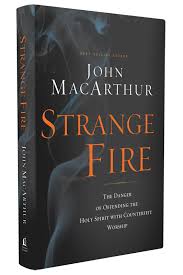 The Charismatic movement has created a lot of confusion in evangelical churches over the past century, even more so in the past fifty years. John MacArthur has written a new book that he hopes will cause many people to examine their beliefs and correct the problems that are now facing the Church. Strange Fire is our book of the Month, and you will gain a full understanding of what has motivated him to take such a strong stand: it’s the gospel.
The Charismatic movement has created a lot of confusion in evangelical churches over the past century, even more so in the past fifty years. John MacArthur has written a new book that he hopes will cause many people to examine their beliefs and correct the problems that are now facing the Church. Strange Fire is our book of the Month, and you will gain a full understanding of what has motivated him to take such a strong stand: it’s the gospel.
MacArthur has authored two other books on this issue during his ministry. He sees that the situation has grown worse because the gospel has not only been neglected, but in many cases, indeed, in a major portion of the Charismatic movement, it has been replaced with a gospel that is not true.
He knows that there are many charismatics who faithfully hold to the gospel, but he also points out that those people are a huge minority. That is why he felt the need to address this, both at the recent Truth Matters conference and in this book.
The book is divided into three sections. In the first, MacArthur expresses his concern about what is happening to the gospel within the broad charismatic movement. He provides a lot of evidence of what has been happening around the world. Then he provides a challenge over the curse of two chapters for believers to do what the Bible tells us to do: Test the spirits. And from 1 John 4:1-8, he asks five questions to examine the modern Charismatic movement.
The second section takes a chapter each to explain four specific gifts that are abused within charismatic circles today: apostles, prophets, tongues, and healing. It would be impossible in this short review to give you all of the details and arguments presented, but these chapters are worthy of careful study. Suffice it to say that MacArthur points out that with each of these gifts, what is being practiced today in charismatic churches is different than what was practiced in the New Testament church. Even most charismatics admit that such is the case. Apostles are not the same, prophets are fallible (they make false prophecies!), tongues are not real languages, and the healing that is portrayed is completely different than that which is accomplished by the Lord Jesus and His apostles. That is a problem. It is not the biblical gifts.
The final section of the book shows that MacArthur truly does recognize and appreciates the work of the Holy Spirit in the life of Christians today, something that he has been accused of ignoring. He shows from scripture how the Holy Spirit works in our salvation and sanctification, as well as in how He works through the Word of God to teach us and change us. This is the true ministry of the Holy Spirit in the Church today.
 His final chapter is a special message to those leaders who are continuationists (someone who believes the miraculous gifts are still present today, though they may not practice them). Yet they do not condone the excesses of the broad charismatic movement. MacArthur counts many of these leaders as good friends and faithful defenders of the gospel. However, he says that it is dangerous to hold such a position, giving eight reasons to support his argument.
His final chapter is a special message to those leaders who are continuationists (someone who believes the miraculous gifts are still present today, though they may not practice them). Yet they do not condone the excesses of the broad charismatic movement. MacArthur counts many of these leaders as good friends and faithful defenders of the gospel. However, he says that it is dangerous to hold such a position, giving eight reasons to support his argument.
As we have come to expect from MacArthur, the book is full of scripture to support his message. He also has an abundance of footnotes to document the problem that is confronting the Church today. The problem is real. We all know people who are involved in charismatic churches and who love the Lord as much as we do. But that is not the problem, as MacArthur explains in this book. His message needs to be taken seriously if we are concerned for the lost people who are hearing a false gospel. Remember this as you read the book (and I hope you will!): It’s about the gospel!
